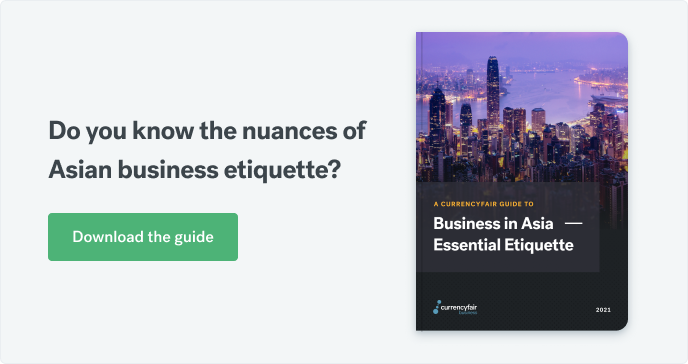Business in Asia - A Complete Introduction
Here we offer full analysis of Asia’s best business locations, what to expect, the main opportunities and risks, and how to prepare for them.

Asia defies easy definition and in geographical terms at least is something of a flexible concept.
According to the United Nations, Asia is the Earth’s largest and most populous continent, with 77 different countries, 4.5 billion people or 60% of the world's population, and covering about 30% of its total area.
Spanning many ethnic groups, religions, languages and cultures, a common thread in both Asia’s established and emerging business locations is an upward trend in key economic and social indicators. According to McKinsey, Asia accounted for just under one-third of global GDP in 2020, and will top 50 percent by 2040.
Narrowing the focus somewhat then, the 10 countries in the Association of Southeast Asian Nations (ASEAN) economic union, are forecast to enjoy positive growth in 2021. In particular the major economies of Malaysia, Thailand, the Philippines, Indonesia and Vietnam are making solid progress. According to the International Monetary Fund (IMF) their rate of growth, which contracted 0.3 percent in 2020 due to the Covid-19 pandemic, will rebound to 5 percent in 2021.
With its expanding middle class and high rates of internet access, the region boasts a large tech-savvy talent pool and a business-friendly ecosystem. This has resulted in an increase in foreign companies choosing to invest and locate there.
Southeast Asia’s human capital has been a significant driver of growth in recent times with highly skilled and affordable labour. The size of its markets, strategic location and expanding infrastructure, are also factors attracting foreign companies. There are generally favourable corporate tax regimes and a stable political and economic environment.
With a few notable exceptions, foreign investors can establish a business with relative ease in most countries. That said, for any business wishing to set up or expand into Asia, there are challenges to overcome.
Download A CurrencyFair Guide to Business in Asia - Essential Etiquette
There are always risks entering new markets, but failing to respect the proper business etiquette shouldn’t be one of them. Our guide outlines some of the essential rules of etiquette when doing business in Asia.
- At a glance overviews of major Asiatic countries
- Outline of some of the key Asian trade associations
- Explanations of cultural business etiquette
Minimising risk is essential when starting a business abroad because if things don’t go to plan, it can be costly. When setting up in Asia, like other locations, some level of risk must be expected. To stay ahead, it’s vital to be aware of the potential obstacles, which we expand on here, and make informed decisions to alleviate them. Detailed and effective planning will help you avoid some of the common mistakes when expanding into Asian such as :
-
Not having a clear strategy that recognises your existing operational, financial and managerial capabilities to assess if you need additional resources.
-
Failing to understand the big picture and not having a holistic view of what you need to achieve in a new market to be viable.
-
Not knowing your target market and its economic drivers in detail to build the right infrastructure and relationships.
-
Not having sufficient manpower and being unable to absorb new hires into your existing workforce and culture.
-
Overlooking the need to revisit your sales and marketing tactics to hook new customers.
If purchasing a business overseas, the importance of understanding the buying process, verifying the seller’s claims and performing due diligence can’t be understated.
When starting a business in Asia, don’t assume anything, be direct and ask the right questions. The rules around ownership and establishing a legal entity as a foreigner can vary, it also pays to anticipate the legal, HR, and tax compliance challenges that are a traditional barrier to overseas expansion.
There is no substitute for placing yourself on the ground, living in the location for an extended period of time to understand the market, meet the people and win the trust of customers and partners.
Asia has some of the world’s best locations for doing business, with five countries featuring in The World Bank’s prestigious Ease of Doing Business report. The publication compares each country across the globe in 12 areas of business regulation.
The measures compared include the procedures, time, cost, and minimum capital required to start a business, construction permits, getting electricity, paying taxes, corporate governance, employment regulation, and public procurement. The latest 2020 report shows that five Asian countries feature prominently in the top 20. They are:
-
Singapore (2nd)
-
Hong Kong (3rd)
-
South Korea (5th)
-
Malaysia (12th)
-
Taiwan (15th)
With their expanding economies and growing business opportunities, it’s little wonder that foreign investors are increasingly seeing the possibilities in these locations.
Singapore
Located in the heart of south-east Asia, Singapore is recognised as one of the world’s top business locations. A global hub for commerce, business-friendly Singapore offers international companies strong investment opportunities and a low corporate tax rate of 17%.
The city-state’s tax regime also features a concessional rate for the first S$200,000 of a foreign company’s income, 0% tax on capital gains and no withholding levy on post-tax dividends paid from there.
Not only has Singapore established a reputation as a financial trading center, it is one of easiest places to incorporate and own a business for foreign nationals. With a talented, educated, and predominantly English-speaking workforce, Singapore is a highly attractive business location.
Indonesia is a major trading partner of Singapore, with the two countries enjoying strong economic cooperation. With a population of over 270 million people, Indonesia is the largest economy in Southeast Asia and one of the world’s strongest emerging markets. It also has the world’s largest Muslim population of approximately 225 million.
Ranked 73rd in ease of doing business, starting an enterprise or legal entity in Indonesia as a foreigner is more challenging than other Southeast Asian countries. Prior familiarity with cultural values and behaviour and how to socialise with prospective customers, employees, and partners is essential.
Hong Kong 
Situated at the crossroads of China and north Asia, Hong Kong is an ideal location to establish a presence both in the region and for international trade. A strategic entry point to mainland China with a strong global manufacturing base, Hong Kong is one of the world’s most rapidly expanding regions.
There are a number of reasons why doing business there is an attractive prospect; a corporate tax rate of 16.5%, a skilled and educated local population, and a booming tourism industry, are just some. Hong Kong’s competitive tax regime means no capital gains taxes, while capital transaction and investment gains are fully exempt. Foreign nationals can set up a company in Hong Kong and own 100 percent of it, regardless of nationality or residence.
South Korea
Divided from North Korea in 1948 and allied to the USA, South Korea is bordered by both China and Russia and sits on a peninsula to the north-east of the continent. Its capital and commercial centre is Seoul, one of the largest cities in the world with over 10 million inhabitants. The broader Seoul metropolitan area is home to over 24.5 million people, in a country that’s among the globe’s most densely populated.
Thanks mainly to foreign investment, the country's economy has grown rapidly to become the 15th largest in the world. To those foreign companies willing to invest in and contribute to the local economy, the South Korean government offers a number of incentives.These include prime industrial sites, reduced rents, free trade zones, tax rebates, and various grants. Start-ups can also avail of generous government backing with the country enjoying a reputation for high-tech talent.
Malaysia 
A vibrant and dynamic environment with a pro-business government and market-orientated economy, Malaysia is an attractive destination for foreign entrepreneurs and investors. It is south-east Asia’s second most advanced economy with GDP per capita behind only Singapore. The country is regarded as an innovative international finance centre and springboard for expansion into the region.
Ranked 12th globally for ease of doing business by the World Bank Group, over the past five years it has had consistent economic growth of close to 5%, and a low inflation rate under 1.8%. The standard corporate tax rate is 24%.
With an ethnically diverse and multicultural population, Malaysia is open to foreign investments with 5,000 foreign companies present there. Foreign companies can tap into a highly educated and skilled workforce, that is frequently multilingual speaking English, Malay, and Chinese.
Taiwan 
Taiwan has become an increasingly attractive business location that encourages foreign companies to establish there. With a stable democracy and supportive fiscal climate, Taiwan, the fourth Asian tiger, alongside Singapore, Hong Kong and South Korea, has become a global technology leader.
Tech businesses are highly incentivised here, with low interest loans for research and development (R&D) projects and innovation, accessible loans, and tax advantages. The corporate tax rate in Taiwan is 20%, and some businesses are exempt from corporate tax if they fall below certain income thresholds.
In Taiwan both Mandarin and English are spoken, and a highly skilled labour force is supplemented each year by large numbers of graduates across various industries.
Recently we published a more detailed exploration of the costs of setting up a business in Asia and how to manage them, covering incorporation and permits, market research, premises, staffing expenses and currency exchange.
It’s impossible to ignore the economic impact of the Covid-19 pandemic, particularly in key sectors such as tourism, retail and other industries with disrupted supply chains. Although the virus did not spread as rapidly in Asia as in other parts of the world, it has disportionately impacted the most vulnerable. It is hoped that the recovery will be as dramatic as the downturn was, and society and the broader regional economy will return to full health soon.
Despite that, there are plenty of reasons to be positive. Many countries in south-east Asian have traditionally had a strong automotive and electronics manufacturing base, as well as growing services in health and biotechnology.
Allied to that, the digital technology sector is thriving. Internet usage is undergoing rapid growth with 400 million users, extensive mobile phone penetration and telecommunications infrastructure improvement also supporting the region’s booming digital economy.
Growth in areas like e-commerce, fintech, cloud services and communications technology is being fuelled by a diversified tech ecosystem, greater regulatory cohesion and pro-innovation governments that are encouraging foreign investment, right across the region. Another area of opportunity is in real estate technology with property operators in Singapore and Hong Kong reporting increased tech adoption in response to the pandemic.
Asia does not fit easily into simple definitions and in cultural terms has a large variety of ethnicities, languages and cultures. Similarly, there is no single business etiquette or means of categorising it, but there are important differences compared with the west, in the main business locations we have discussed. To succeed in business in any Asian country, it pays to have a basic understanding of the culture and local nuances.
Failure to respect these important cultural differences can cause offence, and lead to long-term damage to your company’s reputation. In fact, it could even derail your expansion plans entirely. In Currencyfair’s Guide to Business in Asia - Essential Etiquette, we look at the cultural nuances that should be of major consideration for any business looking to move into the asian market.
One of the most significant differences is that business in Asia is far more relationship driven than Europe and the US. To truly understand the culture and people it’s important to be local, to go to the destination for an extended period of time and immerse yourself in it. That was one of the key lessons in our Business Culture in Asia webinar, featuring a panel of experienced business leaders with crucial learnings to impart about their expansion into Asia.
Our CFO Ruth moved over to Hong Kong for a year in order to place herself on the ground and make all the local connections so we could get our infrastructure built in the region. I am a firm believer in boots on the ground.
Paul Byrne, CEO and President, CurrencyFair
Many companies have chosen to outsource in Asia to achieve their objectives. Clearly when outsourcing specific tasks or entire business functions, as in the case of business process outsourcing (BPO), cost is a key consideration. Accessing the economies of scale that outsourcing companies achieve can improve cost savings by reducing overheads. They have bigger talent pools and access to the latest technology.
With both established and emerging outsourcing locations, Asian countries such as the Philippines, Vietnam, Thailand, Malaysia and Indonesia are continually evolving the breadth of their outsourcing services and support. Some of the most commonly outsourced tasks are digital marketing, accounting and IT-related services with firms expanding their offering to include niche services such as R&D and product development.
One sector taking advantage of the outsourcing opportunities in Asia is film, television and animation. To conquer operational challenges, reduce costs and achieve faster turnaround times, large numbers of animation companies, in particular, are realising that Asian business process outsourcing can help. South-east Asia is fast becoming a hub for American television animation. When seeking opportunities for growth, emerging markets are evidently offering new value, just one of topics we explore in our Guide to Global Animation Outsourcing.
Guide to Global Animation Outsourcing
When it comes to opportunities for growth and collaboration in the Animation industry, it’s clear that emerging markets are bringing new value. Learn all about the increasing importance of outsourcing with our guide now.
Whether you pay suppliers, contractors or employees overseas, or import or export goods, you need to consider the potential impact of exchange rate fluctuations. By proactively taking control of this area of your business, you’re able to limit any potential negative impact of currency exposure and manage your costs more effectively.
CurrencyFair is an international money transfer and payments platform focused on providing the best available exchange rates and experience for customers who need to send money and make payments overseas.
We help businesses of all sizes save money, save time, and stay in control of their payments to overseas suppliers, contractors and staff in their local currency.
Businesses can send money into their CurrencyFair account in 17 currencies and exchange into 22 currencies including Thai Baht, Indonesian Rupiah, Indian Rupee, Singapore Dollar, Hong Kong Dollar, and Philippine Peso.
Businesses can securely send money to over 150 countries. CurrencyFair is fully licensed and regulated, with a 10-year track record of best-in-class service.
CurrencyFair’s Business Team works with business customers who are exposed to currency fluctuations, offering highly competitive rates.
Related articles
If you are interested in business in Asia, we thought you might also like these blog posts.

Why Asia offers real opportunity for proptech innovation and growth
Real estate is the largest asset class in the world and the Asia Pacific region accounts for 40% of that market, meaning huge potential for proptech.

What you should know when buying or starting a business in Asia
The reasons to consider Asia as your next business destination are numerous. These tips are designed to put your Asian growth plans on a solid footing.

The costs of setting up a business in Asia and how to manage them
If you’re thinking about doing business in Asia, you’ll need to carefully consider the costs involved and how you plan to manage them

